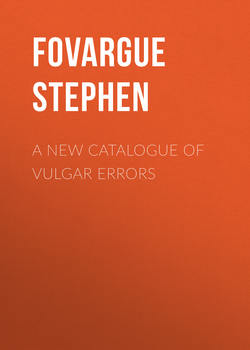Читать книгу A New Catalogue of Vulgar Errors - Fovargue Stephen - Страница 1
PREFACE
ОглавлениеTo explain the Use of Education, no Method can be more effectual, than to shew what dull Mistakes and silly Notions Men are apt to be led into for Want of it. These Mistakes are so numerous, that if we were to undertake to divulge all the Errors that Men of no Knowledge in the Sciences labour under, the shortest Way would be to publish a compleat System of Natural Philosophy, which Learning, as it may be acquired by reading the different Books, which have already been wrote upon that Subject, in this Æra of the Sciences, such an Undertaking would be quite needless at this Time, even supposing the Author capable of that laborious Work.
If the following Sheets do but serve to divest Men of some of those unreasonable Obstinacies with which they and their Forefathers have long been prepossessed, the Time will be well laid out, both of the Writer and Reader.
Be not affronted, gentle Reader, at my taxing thee with Error, with Obstinacy, or the like; thou mayest not be one of that Stamp; for any Thing I know you may have studied the Sciences, you may be well versed in Mechanics, Optics, Hydrostatics, and Astronomy; you may have made the Tour of Europe, if not, you may soon do it in Post-Chaises, and be almost as wise as you was when you went out; or you may be one of those whom bountiful Nature has blessed with a most excellent Understanding, a quick Apprehension, and a discerning Judgment, and yet not have been so fortunate, or unfortunate, which you think proper to term it, as to have been brought up a Scholar.
Scoff not when we dwell so much upon Scholarship; for I would have thee know, whether thou thinkest proper to believe me or not, that had it not been for the four Branches of Learning abovementioned, thou wouldest not have been smoaking that Pipe of right Virginia, which in all Probability (whether thou art a Farmer in the Country, or a Mechanic in London) thou art now most pompously blowing to Ashes: Neither would that charming Bowl of Rum and Brandy Punch mixed, have waited at thy Elbow to inspire thee with generous Sentiments (which Punch, let me tell thee, if thou drinkest in Moderation, may keep thee from the Ague, if thou livest in the Hundreds of Essex.) – Nay, thou wouldest not even have known what it was to have tasted a Plumb-Pudding, which, tho' now, thy Palate being vitiated with salt Pork and Mustard, and bottled Beer, thou hast no Relish for, yet thou mayest remember the Time when thou didst think it most delicious Food. To Philosophy art thou beholden for all these Dainties and Comforts of Life, which if thou dost contradict, and dost still obstinately persist in thy own Opinion, and wilt not be convinced of thy Errors, know, Dust and Ashes, that thou art not sensible whether thou movest or standest still; and dost imagine, that the glorious Sun is an extempore Whirligig.
Wonder not, Reader, if thou art a Man of Sense, that thou shouldest be mistaken in many Things: For what Mortal can pretend to such Knowledge as never to be mistaken? Truth is more difficult to be found out than is generally imagined: Error is easily fallen into; by so much the easier as the Odds are against us: For in the Disquisition of any Point, there are numberless Wrongs, but there is only one Right. Numberless Falshoods and Errors may be raised about any Thing, but Truth is invariable, and remains the same to all Eternity.
The following Sheets will not contain many philosophical Terms; we shall rather avoid such a Step as would hinder a great Part of our Readers from understanding us, and shall endeavour to explain ourselves by such Methods as the meanest Capacity will be able to comprehend. Moreover, all such Subjects will be avoided as may interfere with any religious Tenets, it not being the Intention of this Pamphlet to deprive Men of their Rest, by tearing from their Consciences those fixed Protestant Principles of Religion (let them be what they will) which they and their Ancestors have long and peaceably enjoyed. But our Disquisitions will be chiefly confined to natural Objects, and the Phænomena which daily present themselves to our View. We shall likewise endeavour to rectify some of those Mistakes in the common Arts of Life, whether of Business or Pleasure, which Men by an accustomed Tradition are apt most obstinately to persevere in.
